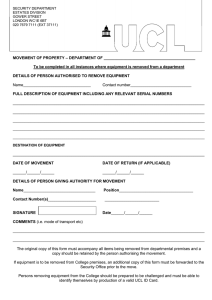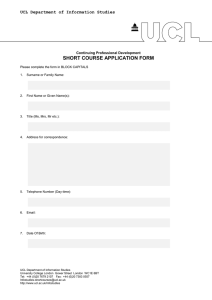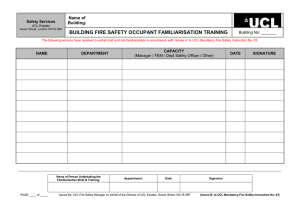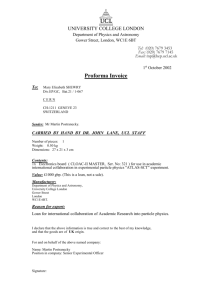BASIC FIRE SAFETY GUIDANCE AT UCL STUDENT HALLS OF RESIDENCES
advertisement
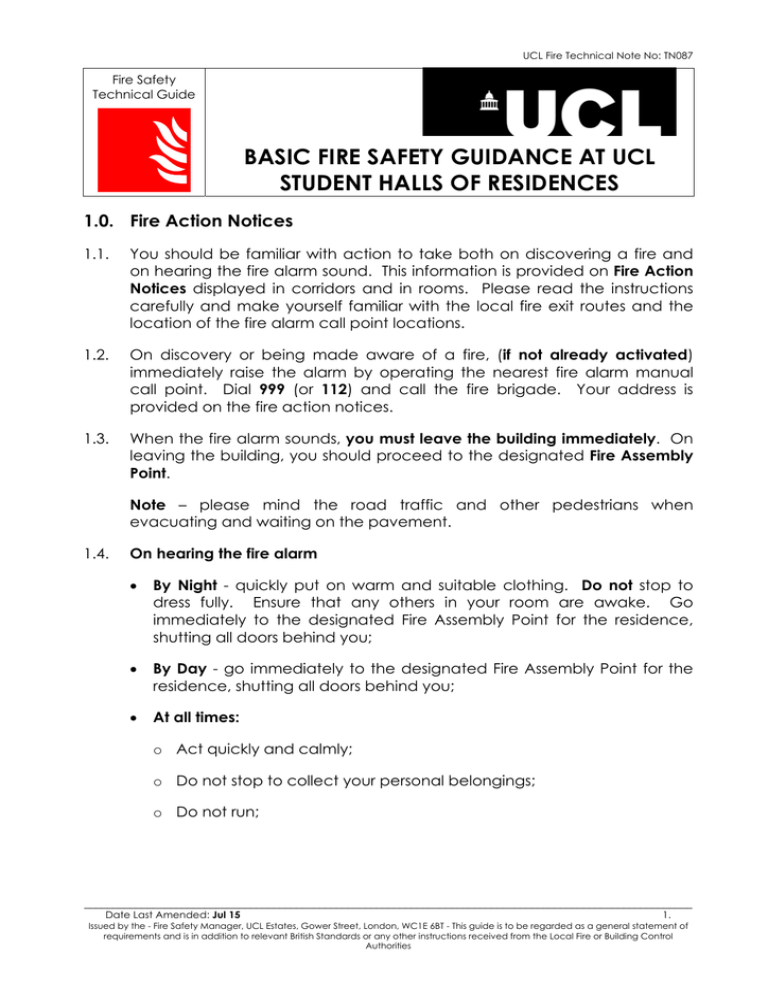
UCL Fire Technical Note No: TN087 Fire Safety Technical Guide BASIC FIRE SAFETY GUIDANCE AT UCL STUDENT HALLS OF RESIDENCES 1.0. Fire Action Notices 1.1. You should be familiar with action to take both on discovering a fire and on hearing the fire alarm sound. This information is provided on Fire Action Notices displayed in corridors and in rooms. Please read the instructions carefully and make yourself familiar with the local fire exit routes and the location of the fire alarm call point locations. 1.2. On discovery or being made aware of a fire, (if not already activated) immediately raise the alarm by operating the nearest fire alarm manual call point. Dial 999 (or 112) and call the fire brigade. Your address is provided on the fire action notices. 1.3. When the fire alarm sounds, you must leave the building immediately. On leaving the building, you should proceed to the designated Fire Assembly Point. Note – please mind the road traffic and other pedestrians when evacuating and waiting on the pavement. 1.4. On hearing the fire alarm By Night - quickly put on warm and suitable clothing. Do not stop to dress fully. Ensure that any others in your room are awake. Go immediately to the designated Fire Assembly Point for the residence, shutting all doors behind you; By Day - go immediately to the designated Fire Assembly Point for the residence, shutting all doors behind you; At all times: o Act quickly and calmly; o Do not stop to collect your personal belongings; o Do not run; __________________________________________________________________________________________________________ Date Last Amended: Jul 15 1. Issued by the - Fire Safety Manager, UCL Estates, Gower Street, London, WC1E 6BT - This guide is to be regarded as a general statement of requirements and is in addition to relevant British Standards or any other instructions received from the Local Fire or Building Control Authorities UCL Fire Technical Note No: TN087 2.0. MEANS OF ESCAPE 2.1. Corridors, landings, stairs & exits from a building are major escape routes in case of fire. Please do not obstruct these areas by storing or placing bicycles, personal belongings or rubbish on these routes. 3.0. FIRE DOORS 3.1. Fire doors are provided for all accommodation rooms, corridors, kitchens, storerooms and stair enclosures and are generally signed ‘Fire Door Keep Shut’ and fitted with self-closing devices. They are essential in preventing the rapid spread of fire and smoke. You must not obstruct or wedge the doors, or remove the self-closing device. If the door is damaged or not fully closing, then you must report the fact to the Residence Manager for immediate repair works to be undertaken. Fire doors are critical life safety equipment that prevents the travel of dangerous smoke & hot gasses into escape routes. DO NOT WEDGE OR HOLD KITCHEN FIRE DOORS OPEN UNDER ANY CIRCUMSTANCES - KEEP FIRE DOORS CLOSED TO PREVENT UNWANTED FIRE ALARMS 4.0. FIRE ALARMS 4.1. Fire alarms are provided to give warning in case of fire, as smoke and fire can spread very quickly. Always leave the building on hearing the alarm immediately by the nearest available exit (you should be familiar with your escape routes and Fire Assembly Point). To prevent accidental activation of smoke detectors: Do not cook (including toast) in bedrooms and only use designated kitchens, keeping the fire doors closed at all times; Do not use hair spray under or near the smoke detector; Smoking is not permitted in any Halls of Residences; Candles and aromatherapy burners are not permitted - please do not use for your and that of others safety in the residences; 5.0. FIRE EXTINGUISHERS 5.1. Fire extinguishing equipment has been provided throughout Student Halls of Residences, do not interfere with pins, tags or maliciously set off the fire extinguishers. These extinguishers are life safety equipment and for use in the event of a fire. __________________________________________________________________________________________________________ Date Last Amended: Jul 15 2. Issued by the - Fire Safety Manager, UCL Estates, Gower Street, London, WC1E 6BT - This guide is to be regarded as a general statement of requirements and is in addition to relevant British Standards or any other instructions received from the Local Fire or Building Control Authorities UCL Fire Technical Note No: TN087 6.0. FIRE EVACUATION DRILLS: 6.1. Meetings will be held in each of the residences early in the first term to elaborate on the above procedure, to hold a fire drill, to answer queries from residents. Further fire drills may take place without notice at any time. 7.0. GENERAL FIRE PRECAUTIONS 7.1. Any person found interfering in any way whatsoever with fire-fighting equipment or alarms, other than for proper use, will be required to leave the residence permanently. In addition, all such persons will be referred to the Warden or Residence Manager, as appropriate, who will take disciplinary action against the student but such action will not preclude an independent action by the Fire Authority under appropriate statutes. Frivolous discharge of fire extinguishers will be charged to the individual or to all residents of the residence if the culprit is not known. Smoking is NOT permitted in UCL Halls of Residences (or any UCL premises); The use of candles, incense, fireworks or hookah pipes are NOT permitted in any UCL Halls of Residence; Always, switch off electric fires, heaters and all other electric appliances and lights when you leave your room and at night; Do not use paper light shades or paper masking on any light fitting; Do not use plastic or wicker waste paper bins and empty waste paper bins every day; Never, hang washing on or near Convector Heaters and do not obstruct in any way the airflow around these types of heaters; Never, leave the kitchen when you are cooking food and be especially careful with hot fat and oil. Any resident who leaves deep-frying or other cooking unattended may be suspended from residence. Do not cook in your bedrooms and BBQ's are not permitted; The use of portable heating and cooking equipment in your room is strictly forbidden; Do not bring hazardous substances into your room even from laboratories or other UCL premises; Plug-in air fresheners are not permitted – these have been identified as the cause of several large fires, including fatal fires; __________________________________________________________________________________________________________ Date Last Amended: Jul 15 3. Issued by the - Fire Safety Manager, UCL Estates, Gower Street, London, WC1E 6BT - This guide is to be regarded as a general statement of requirements and is in addition to relevant British Standards or any other instructions received from the Local Fire or Building Control Authorities UCL Fire Technical Note No: TN087 Surfaces and equipment in drink and food preparation areas - must be kept clear of combustible materials. For example, paper towels, paper plates, plastic cups, cutlery and polystyrene type products; which should be stored in cupboards or non-combustible containers; Electric power adapters and extension leads - must not be used for drink and food preparation equipment. Electrical equipment must be inspected and PAT tested to comply with Electricity at Work Regulations 1989; 8.0. ELECTRICAL SAFETY 8.1. UK Electrical Supply - you are reminded that the UK electrical supply is 230 Volts (not 110 volts) and only electrical equipment purchased in the UK should be used. However, if you need to use 110-volt equipment then you must have an approved voltage, plug/pin converter, and ensure that you ask for advice and assistance (from the shop/supplier) on the voltage/pin compatibility and specific voltage requirements you require. ONLY USE 230v equipment with an appropriate and correctly designed plug or adaptor; Do not use adapters on pendant light fittings; Do not allow flexes to trail across floors; If you are unsure on how to use the cooker or other equipment in the kitchen then please seek advice from the Residence Manager or one of the Wardens; Do not use open electrical bar fires; Do not use cuboid adapters; Only use fused power boards with a length of flex are accepted, with an extension cable and fused are acceptable. Maximum load for any one socket should not exceed 13 amps; __________________________________________________________________________________________________________ Date Last Amended: Jul 15 4. Issued by the - Fire Safety Manager, UCL Estates, Gower Street, London, WC1E 6BT - This guide is to be regarded as a general statement of requirements and is in addition to relevant British Standards or any other instructions received from the Local Fire or Building Control Authorities UCL Fire Technical Note No: TN087 Check electrical leads and plugs for wear and tear and faulty wiring; Throw away and replace damaged cables. Never use tape to mend or join cable; Frayed leads or exposed internal wires are fire risks; UK Fuses Type Please ensure you have a competent person repair air replace electrical equipment of fuses’: Always use the correct fuse in fused plugs - Plugs in the UK are generally fitted with a 3A or 13A fuse. For appliances up to 700w you need to use a 3A fuse (i.e. Desk Lamp, Mobile Phone Charger Television, DVD, Computer, Printers, Refrigerator; For appliances over 700w you need to use a 13A fuse (i.e. Washing Machine, Microwave, Kettle, Toaster, Iron, Hair Dryer / Curlers, Fan (Portable), Coffee Maker & Rice Cookers; End __________________________________________________________________________________________________________ Date Last Amended: Jul 15 5. Issued by the - Fire Safety Manager, UCL Estates, Gower Street, London, WC1E 6BT - This guide is to be regarded as a general statement of requirements and is in addition to relevant British Standards or any other instructions received from the Local Fire or Building Control Authorities
